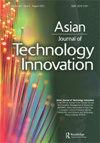The effect of government R&D subsidies on corporate R&D investment in South Korea: verification using meta-analysis
IF 1.7
4区 管理学
Q3 BUSINESS
引用次数: 1
Abstract
ABSTRACT Whether public R&D subsidies complement or substitute private R&D investment has long been a subject of debate. Also, the results of previous studies on whether R&D subsidies are effective for large corporations or more effective for SMEs have been mixed. This study analyses research studies in Korea over the past 20 years and provides comprehensive conclusions on these controversies. As a methodology, firstly, meta-analysis is performed to synthesise the results of previous studies. Secondly, more sophisticated effect sizes are estimated by meta-regression analysis, and then panel analysis is performed to confirm robustness. The results indicate that government R&D subsidies have a positive (+) additionality effect on corporate R&D investment. It is also found that the additionality effect is larger when R&D subsidies are provided to SMEs rather than large enterprises. Analysis by time showed a negative (−) effect appears initially, and the trend improved over time to a positive (+) effect. The results of this study can be used as primary data for verifying the economic feasibility of the government R&D supports and setting the basic direction for the R&D subsidy policy in the future.政府研发补贴对韩国企业研发投资的影响——基于荟萃分析的验证
公共研发补贴是对私人研发投资的补充还是替代,一直是争论的焦点。此外,以前关于研发补贴对大公司有效还是对中小企业更有效的研究结果参差不齐。本研究分析了韩国过去20年的研究,并就这些争议提供了全面的结论。作为一种方法,首先,进行荟萃分析以综合先前研究的结果。其次,通过元回归分析估计更复杂的效应大小,然后进行面板分析以确认稳健性。研究结果表明,政府研发补贴对企业研发投入具有正向(+)附加效应。研究还发现,当向中小企业而非大型企业提供研发补贴时,额外性效应更大。按时间分析显示,最初出现负(−)效应,随着时间的推移,趋势改善为正(+)效应。本研究的结果可作为验证政府研发支持的经济可行性和确定未来研发补贴政策基本方向的初步数据。
本文章由计算机程序翻译,如有差异,请以英文原文为准。
求助全文
约1分钟内获得全文
求助全文

 求助内容:
求助内容: 应助结果提醒方式:
应助结果提醒方式:


